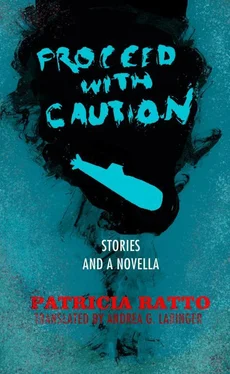On the other side of the passageway, Soria makes his bed. Lying in my bunk, I watch him take the sheets out of his light-blue bag; they look coarse, stiff with that starch, that rubber sizing they have from the factory. It’s a sure thing they didn’t give him time to wash them, no way did they give him enough time, like so many of us. He’s picked the top one, the third bunk from the bottom. He touches the mat; it probably feels damp. I had the same reaction when I went to lie down, but in fact it was cold; everything is cold here. Later on it’ll be a little warmer, human warmth, the warmth of machines, too, of being enclosed. He unzips the mattress cover, a kind of envelope made of tightly woven sailcloth. He takes out the blanket and leaves it on the lower bunk. He flips the mattress over, adjusts it, slaps it gently with his open palms, spreads out the fitted blue sheet, navy blue, now the top sheet, also blue, but with stripes, some lighter, others darker, and every so often a very thin white one. He tucks one corner underneath the mattress, fastening it in place with a knot; it seems Soria doesn’t like his sheets to come loose while he’s sleeping. The thing is, he’s very tall. He picks up the pillow, slightly sunken in the middle, exchanges it for the one on the lower bunk (he hasn’t noticed I’m watching him; he must think I’m sound asleep), fluffs it a little with his hands, slips on the pillowcase and places it at the head of the bed. He takes the blanket he left on the lower bunk, unfolds it with a firm shake in the air, and spreads it over the mattress, smoothing out the fold lines, tucks in all the edges along the entire bunk bed. It’s ready now. He picks up his bag again, rummages in his things till he finds his wallet, checks inside, pulls out a bill that looks like a fiver (judging from the color), folds it, and puts it back. He takes out a small photo, studies it intently, then looks upward. There’s a slot: he wedges the photo in and stares at it for a few seconds; he seems satisfied. Now he pulls out a tape recorder, the kind with keys, and some boxes of cassettes, which he sets under his pillow. He pulls on the cords, closing the bag with the rest of his belongings inside, takes a few steps toward the lockers, opens the door to one of the cubbies and sticks the bag inside, squashing it a little toward the bottom and the back; he closes the door. Voices are approaching; you can hear laughter, too. Somebody announces that it’s Monday, two-thirty. I pretend to be asleep so they won’t say I’ve been spying, and in fact I don’t want them to say anything. And I hear the order: we’re diving; from now on we’ll be traveling submerged.
For days now I haven’t been able to find my boots. I’ve looked for them everywhere, but it’s hopeless; just in case, though, I look under the bunks once more. Slightly toward the direction where the torpedo launchers end, Almaraz is writing in a little black notebook, in a very neat script; on the table beside him, there’s a photo of a woman with a baby in her arms. I keep searching for my boots; no doubt someone hid them to play a gag on me, though it doesn’t matter now—who wants to wear knee-high leather boots, only to get them covered with grease and walk around uncomfortably, making noise, on a submarine? Sometimes I think that someone on land, behind a desk, making decisions about clothing or so many other issues, tries really hard to screw us up because he’s bored, as if all of us were part of a huge joke. When I think about those things, I can see the Hyena’s smile: it follows me around, sticks to me, and it’s hard for me to make it go away. Some people brought sneakers; others of us—like Soria and Heredia and Albaredo and so many more—walk around in our stocking feet, two or three pairs, one on top of the other, because it’s starting to get cold in here now that we’re submerged and are pretty far south. In the engine room socks get very dirty, everything gets dirty, full of grease, hardened by grime. On the other hand, the engines give off heat, more heat than they should, more than what’s safe, and maybe we ought to be turning back to get them fixed, but the CO said no, with the icy waters of the southern sea, that overheating will be balanced out. Even though the logical thing would’ve been to head north to intercept any subs or boats coming our way, we’re going in the opposite direction, and for the time being, that’s better for our engines. And so we keep navigating, paying a little more attention to the engines, more attention to the negotiations, as well, even though all we’ve had till now is silence. Most people say that this business will get straightened out and we’ll go home soon, but nobody can be sure of it; nobody knows anything here; nothing is for sure. Uncertainty, that’s the word—everything these days is uncertainty, except for the grime in the socks we’re wearing.
When you’re submerged the silence is complete, like deafness, like when a person has a bad cold and their ears are stopped up. We’re all used to the permanent noise; that’s why this sudden silence almost hurts. Until you get used to it, you have a strange feeling, like an empty space; then, little by little, your hearing returns to normal when it recovers the sounds of movement on board: voices, footsteps, the clanking of tools, the cook’s pots crashing together. Just the same, it all ends up in a muffled din: if you’re in the bunk area, you’re close to the guys who are in the dining room, talking, but the sound hardly reaches you; it turns into a cottony murmur, even though the others are talking loudly. That’s how things are in here.
There are times when I start thinking about food. I linger over the details of every dish I might eat, the colors, the exact flavor of every ingredient, but then, when it comes time to sit down at the table, I hardly eat a thing, nothing, really. Even though the food is good here, and the cook is excellent; but water is scarce, restricted, that’s for sure; you have to be careful not to use it all up. Today the others had potato omelets and fish for lunch. I heard Almaraz say it was very good. This morning Almaraz complained of pain in his chest; he blamed it on the effort he made carrying things aboard on Saturday. The pain’s not too bad, he explained, but it’s annoying. He seems better now, though quite a few guys must have been thinking about my case: the terrible pain a few days ago that knocked me to the floor of the engine room. Of course I’m fine now and I’ve already forgotten about all that. Besides, I haven’t felt the pain since. We’re going to start cleaning the boat, you’ve got to do something, waiting isn’t easy if you’re not doing something concrete. We all get moving, each one heading for the job he’s been assigned. When I pass by the CO’S cabin, I can see, through the little gap exposed by the half open door, that the nurse—standing against the curtain with those little yellow squares inside red squares that covers the shelves with our clothes—is taking his blood pressure. There’s no doctor on board. A few steps beyond that, the cook is reading a D’Artagnan comic book, leaning against the galley counter. Grunwald goes to the head, for three days he’s been running to the head again and again—to our head, the one for the petty officers—in spite of the charcoal that the nurse prescribed for him. We have one head for 28 petty officers, and there’s one head for seven officers. The cook puts aside the D’Artagnan he was reading and picks up another comic that he’s now starting to read. Grunwald comes out of the head, his face pale, and retreats down the passageway toward the bow, swearing softly. We may all be characters in a ridiculous comic strip.
I guess it’s dawn because we’re rising to periscope depth in order to snorkel. The sub is rocking, the sea must be rough on the surface; the sub veers from port to starboard, and immediately you can hear the noise of things falling, rolling, crashing, breaking, some glasses, maybe cups that weren’t stowed away in the galley. In the half-light of nighttime, the first mate gets up to see what’s happened. Suddenly I hear him grumble and swear; then I peek out from my bunk and see him lift his foot, maybe the right one, and grab his toes. The nurse, who also has gotten up because of the noise, goes to him and checks him out. I’m very drowsy and go back to sleep.
Читать дальше












